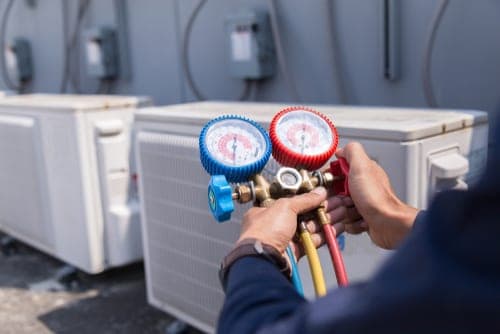Efficient Heating Repairs Done Right by DMAKS HVAC Experts.
Efficient Heating Repairs Done Right by DMAKS HVAC Experts.
Blog Article
How to Select the Right Cooling And Heating System for Your Needs
Choosing the proper heating and cooling system is a crucial decision that requires careful factor to consider of various elements. Begin by examining your home's dimension, layout, and special needs, as these elements determine the required ability and setup of the system. In addition, developing a budget plan that encompasses installment and long-term functional costs is crucial. As you weigh your choices, understanding energy performance scores and the effects of your local environment will play a significant duty in your option. The myriad of system kinds readily available can complicate this process, leading one to wonder which course inevitably leads to optimal comfort and efficiency.
Evaluate Your Home Size
Assessing your home dimension is a crucial first action in selecting the proper A/c system. A Cooling and heating system that is also little will have a hard time to preserve comfy temperatures, leading to enhanced energy intake and wear on the system.
To precisely evaluate your home size, gauge the square video of each space, taking into consideration factors such as ceiling elevation and the format. Additionally, think about the insulation top quality and the variety of home windows, as these aspects affect thermal efficiency. Houses with open flooring plans may need various system arrangements compared to those with several divided areas.
Utilizing the Handbook J tons calculation approach can offer a much more accurate quote of your HVAC requires. This method make up different aspects, consisting of neighborhood climate, solar gain, and occupancy patterns. By meticulously evaluating these aspects, you can make certain that your selected a/c system is appropriately sized, resulting in enhanced convenience, energy effectiveness, and longevity of the devices.
Determine Your Budget
Identifying your budget is an essential action in the HVAC system option process, as it establishes the criteria for your choices - DMAKS HVAC. A HVAC system is a considerable financial investment, and comprehending your economic limitations will certainly help limit selections that fit within your methods
Begin by examining not just the initial purchase cost yet also setup prices, which can differ dramatically relying on the intricacy of the job. Consider continuous expenses such as upkeep, fixings, and energy intake. A system might appear cost effective initially but can result in higher expenses gradually if it is much less effective.
It is suggested to allocate a contingency fund for unexpected expenses that may occur during setup or preliminary system changes (DMAKS HVAC). In addition, discover funding alternatives or discounts that might be readily available, as these can reduce the concern of in advance expenses
Ultimately, having a clear spending plan enables you to involve with a/c specialists a lot more efficiently, guaranteeing you get customized recommendations that aligns with your economic goals and home needs. By being attentive regarding your spending plan, you can make educated choices that boost comfort without jeopardizing monetary security.
Evaluate Power Effectiveness
Power efficiency plays an essential role in the total performance and cost-effectiveness of your heating and cooling system. When selecting a system, it is important to consider its energy effectiveness rankings, as these figures directly influence your utility costs and environmental impact. Look for systems with a high Seasonal Energy Effectiveness Proportion (SEER) for cooling and a high Annual Gas Usage Performance (AFUE) rating for heating. Higher rankings show greater effectiveness, indicating even more convenience for less energy usage.
Additionally, think about the Energy Star accreditation, which symbolizes that the system satisfies strict effectiveness standards established by the Environmental Defense Firm. Spending in a Power Star-rated cooling and heating system can lead to significant savings over time, particularly in areas with extreme temperature level variations.
An additional variable to evaluate is the system's size and capacity. A large or undersized unit can bring about ineffectiveness and raised energy costs. DMAKS HVAC. Appropriate sizing, typically determined through a Hands-on J tons computation, makes sure that the system operates at optimal performance


Consider Environment and Atmosphere
When picking a HVAC system, it is vital to think about the regional climate and ecological problems, as these variables significantly influence the system's performance and effectiveness. Various regions experience varying temperature extremes, moisture degrees, and seasonal adjustments, every one of which influence home heating and cooling demands.

Additionally, local environmental variables, such as air quality and possible irritants, ought to educate your choice. Solutions outfitted with sophisticated purification technologies go now can assist minimize pollutants and offer cleaner air. In addition, consider the energy sources available in your area-- some cooling and heating systems are more effective when powered by gas or eco-friendly energy sources.
Eventually, straightening your HVAC system selection with your regional climate and ecological factors to consider will certainly bring about enhanced comfort, enhanced performance, and reduced power costs.
Explore System Types and Features
As house owners look for to enhance convenience and effectiveness, checking out the numerous sorts of cooling and heating systems and their unique features becomes vital. The main types of cooling and heating systems include central air, heatpump, ductless mini-split systems, and furnaces. Each system offers distinct benefits customized to various requirements and preferences.
Central air conditioning systems offer uniform air conditioning throughout a home, making them ideal for bigger rooms. Warmth pumps work as both heating and cooling options, using electrical power to transfer heat, which can cause reduced energy costs. Ductless mini-split systems are coming to be significantly prominent due to their flexibility and convenience of installation, allowing house owners to regulate the temperature level in specific spaces without substantial ductwork.

Final Thought
In verdict, picking the appropriate heating and cooling system requires cautious consideration of different factors, including home size, budget plan restrictions, energy effectiveness, regional climate, and offered system types. A complete evaluation of these aspects guarantees optimal convenience and cost-effectiveness. By following a structured approach, homeowners can make informed choices that line up with their particular requirements and preferences, inevitably causing improved indoor air quality and energy financial savings.
Report this page